Related Research Articles
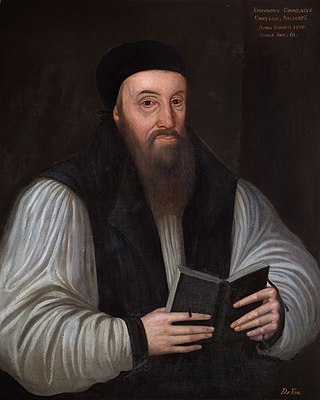
Edmund Grindal was Bishop of London, Archbishop of York, and Archbishop of Canterbury during the reign of Elizabeth I. Though born far from the centres of political and religious power, he had risen rapidly in the church during the reign of Edward VI, culminating in his nomination as Bishop of London. However, the death of the King prevented his taking up the post, and along with other Marian exiles, he was a supporter of Calvinist Puritanism. Grindal sought refuge in continental Europe during the reign of Mary I. Upon Elizabeth's accession, Grindal returned and resumed his rise in the church, culminating in his appointment to the highest office.

John Rogers was an English clergyman, Bible translator and commentator. He guided the development of the Matthew Bible in vernacular English during the reign of Henry VIII and was the first English Protestant executed as a heretic under Mary I of England, who was determined to restore Roman Catholicism.
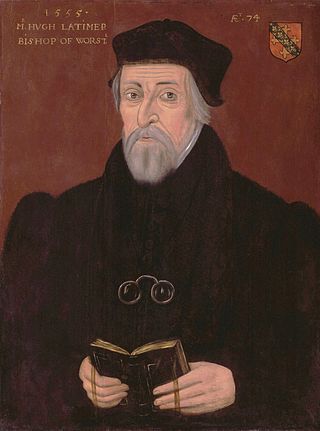
Hugh Latimer was a Fellow of Clare College, Cambridge, and Bishop of Worcester during the Reformation, and later Church of England chaplain to King Edward VI. In 1555 under the Catholic Queen Mary I he was burned at the stake, becoming one of the three Oxford Martyrs of Anglicanism.

John Foxe was an English clergyman, theologian, and historian, notable for his martyrology Actes and Monuments, telling of Christian martyrs throughout Western history, but particularly the sufferings of English Protestants and proto-Protestants from the 14th century and in the reign of Mary I. The book was widely owned and read by English Puritans and helped to mould British opinion on the Catholic Church for several centuries.

Edwin Sandys was an English prelate. He was Anglican Bishop of Worcester (1559–1570), London (1570–1576) and Archbishop of York (1576–1588) during the reign of Elizabeth I of England. He was one of the translators of the Bishops' Bible.

Anne Askew, married name Anne Kyme, was an English writer, poet, and Protestant preacher who was condemned as a heretic during the reign of Henry VIII of England. She and Margaret Cheyne are the only women on record known to have been both tortured in the Tower of London and burnt at the stake.
John Ponet, sometimes spelled John Poynet, was an English Protestant churchman and controversial writer, the bishop of Winchester and Marian exile. He is now best known as a resistance theorist who made a sustained attack on the divine right of kings.

The Marian exiles were English Protestants who fled to Continental Europe during the 1553–1558 reign of the Catholic monarchs Queen Mary I and King Philip. They settled chiefly in Protestant countries such as the Netherlands, Switzerland and Germany, and also in France, Italy and Poland.

Ickham and Well is a mostly rural civil parish east of Canterbury in Kent, South East England.
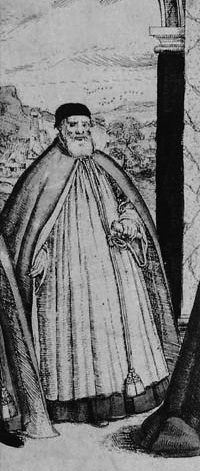
Robert Horne was an English churchman, and a leading reforming Protestant. One of the Marian exiles, he was subsequently bishop of Winchester from 1560 to 1580.
Thomas Sampson was an English Puritan theologian. A Marian exile, he was one of the Geneva Bible translators. On his return to England, he had trouble with conformity to the Anglican practices. With Laurence Humphrey, he played a leading part in the vestments controversy, a division along religious party lines in the early years of the reign of Elizabeth I of England.
Anthony Gilby (c.1510–1585) was an English clergyman, known as a radical Puritan and translator of the Geneva Bible, the first English Bible available to the general public. He was born in Lincolnshire, and was educated at Christ's College, Cambridge, graduating in 1535.
The Canterbury Martyrs were 16th-century English Protestant martyrs. They were executed for heresy in Canterbury, Kent and were the last Protestants burnt during the reign of Mary I. Their story is recorded in Foxe's Book of Martyrs.

The Actes and Monuments, popularly known as Foxe's Book of Martyrs, is a work of Protestant history and martyrology by Protestant English historian John Foxe, first published in 1563 by John Day.

The Guernsey Martyrs were three women who were burned at the stake for their Protestant beliefs, in Guernsey, Channel Islands, in 1556 during the Marian persecutions.
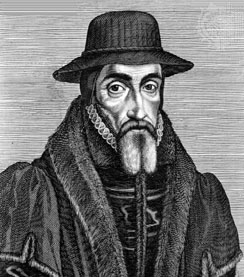
The English Protestant cleric John Foxe of the 16th century, known primarily if somewhat misleadingly as a martyrologist on the basis of his major work Actes and Monuments, wrote also on the interpretation of the Apocalypse, both at the beginning of his writing career in the 1550s, and right at the end of it, with his Eicasmi of 1587, the year of his death.
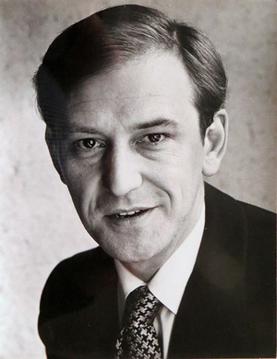
Brett Usher was an English actor, writer and ecclesiastical historian. Although he appeared frequently on stage and television, it was as a radio actor that he came to be best known. His many radio roles ranged widely, from farce to Shakespeare and new works. In addition to acting he also wrote for radio.
John Mullins or Molyns was an English churchman and Marian exile, archdeacon of London from 1559.

The Troubles at Frankfurt was a name given retrospectively to internal quarrels of the Marian exiles in Frankfurt am Main in the mid-1550s, involving also the Scottish reformer John Knox. Politically, Frankfurt was a Free Imperial City of the Holy Roman Empire.
References
- ↑ Michael Zell (2000). Early Modern Kent, 1540-1640. Boydell & Brewer. p. 227. ISBN 978-0-85115-585-2.
- 1 2 3 John Foxe (1859). Narrative of the Days of the Reformation: Chiefly from the Manuscripts of John Foxe the Martyrologist;. Camden Society. p. 342.
- ↑ Christina Hallowell Garrett (10 June 2010). The Marian Exiles: A Study in the Origins of Elizabethan Puritanism. Cambridge University Press. p. 37 note 1. ISBN 978-1-108-01126-6.